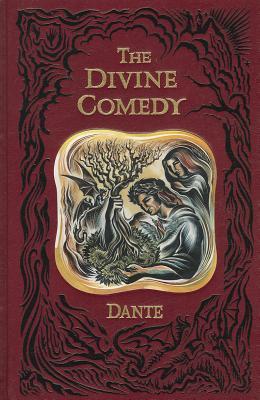Dante’s Divine Comedy is a trilogy of poems describing three realms of the afterlife. Each of the three books in “The Divine Comedy” symbolize an afterlife station, “Inferno” representing hell, “Purgatorio” representing purgatory and “Parasido” representing paradise. The story is told in the first person, and is originally written in Italian, the language of the masses. This was unusual as most literary works of the time were written in Latin, a language not easily read by the common person. “The Divine Comedy” is not a comedy.
In this case, the word “comedy” implies it as a story with a prosperous ending after a difficult beginning. In Dante’s trilogy we learn of a man’s trip through the depths of hell, through redeeming purgatory and finally to paradise and reunion with God. Dante’s first book in the trilogy “Inferno” is a story of a man’s journey through hell. The traveler, Dante, must embark on this ominous journey for the sake of his own soul. He has lost his way in life by straying from the path of righteousness. Dante is fortunate that he has a guide to lead him by encouragement, knowledge and care.
Summary of Dante’s Divine Comedy
The guide is Virgil, a great Roman poet Dante recognizes from mortal life and a person whom he admires. Dante is fearful, he doesn’t think he will survive a trip through hell but knows that he must do this in order to get back on the straight path to God. As the guide and the lost Dante traverse the levels of hell, they learn that each level is its own kind of hell and is divided by types of sin. The eviler the sin, worse are the consequences each soul has to face. As Dante and his guide descend deeper into hell, they see suffering and punishments worsening as fitting to the crimes against humanity and God.
The travelers stop and speak with many lost souls along the way. Dante grows ever more fearful as the journey continues and then finally, it is time to make their way out of hell and continue the journey to Purgatory. After leaving hell behind, Dante is ready to rejoice and sing.
For better waters, now, the little bark of my poetic powers hoists its sails, and leave behind that cruelest of the seas.
The travelers are at a place where Dante can look down at earth and up to Heaven. Purgatory is a place in between, a place of hope and redemption.
Here is the place where souls come to do penitence. It seems to Dante this could be as earth at its very best. As Dante and Virgil enter purgatory they feel an earthquake. They are told by Statius, a singer from Thebes,
That’s why you felt the quake and why you heard the pious dwellers on the mount praise God. May He soon call them up to be with Him. (Purgtorio, Cantos XXI, line 70-72)
Purgatory is a cone shaped mountain with many terraces, seven to be exact. The terraces represent the seven deadly sins, sins against oneself and sins against God.
The last terrace is a river of flames and Dante is once again afraid he will not survive. Virgil tells him they will see Beatrice, Dante’s true love and they continue their journey. The travelers arrive in the Garden of Eden and this is where Virgil takes his leave. Dante sees Beatrice and is filled with over whelming emotions. Beatrice immediately reprimands him for straying so far from the path that he had to travel to the depths of hell to regain what was lost. “Paradiso” is a realm of nine spheres. Each sphere represents a state of mind that all Christians should possess such as faith, hope and love.
Dante sees the Trinity as three rings of different colors all sharing the same space and reflecting upon each other. Everywhere he sees light, and in the light is beauty.
And one is so transformed within that Light that it would be impossible to think of ever turning one’s eyes from that sight.. (Cantos XXXII, line 100-102)
He sees Jesus and the Mother Mary and finally looks upon the face of God. Dante’s trilogy of poems that make up “The Divine Comedy” is studied, often quoted and vastly used in comparison of good verses evil, heaven and hell and the path to the one true God.
Scholars have searched for various meanings to Dante’s work and have described it as the descent of the soul into the depths of corruption and sin. Readers look to Dante’s work as a form of an answer to the question “What happens after we die? ” Dante assures us that the whole poem has a meaning for this world as well as the next. Through Dante’s understanding of theology, astronomy and politics we learn of a man’s trip through the depths of hell, through redeeming purgatory and finally to a reunion with God.

